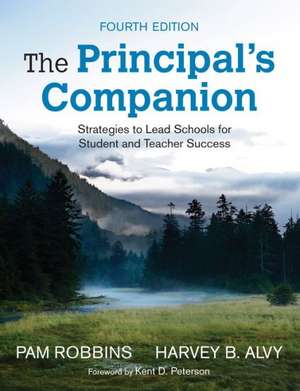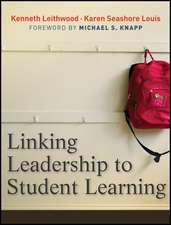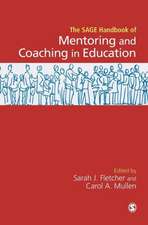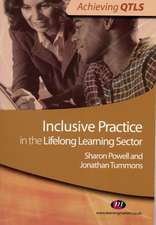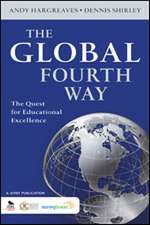The Principal's Companion: Strategies to Lead Schools for Student and Teacher Success
Editat de Pamela M. Robbins, Harvey B. Alvyen Limba Engleză Paperback – 28 mai 2014
Preț: 358.09 lei
Nou
Puncte Express: 537
Preț estimativ în valută:
68.53€ • 71.39$ • 56.98£
68.53€ • 71.39$ • 56.98£
Carte tipărită la comandă
Livrare economică 08-22 februarie 25
Preluare comenzi: 021 569.72.76
Specificații
ISBN-13: 9781452287591
ISBN-10: 1452287597
Pagini: 408
Ilustrații: figures
Dimensiuni: 216 x 279 x 25 mm
Greutate: 1.11 kg
Ediția:Fourth Edition
Editura: SAGE Publications
Colecția Corwin
Locul publicării:Thousand Oaks, United States
ISBN-10: 1452287597
Pagini: 408
Ilustrații: figures
Dimensiuni: 216 x 279 x 25 mm
Greutate: 1.11 kg
Ediția:Fourth Edition
Editura: SAGE Publications
Colecția Corwin
Locul publicării:Thousand Oaks, United States
Recenzii
"As educators we are so fortunate that Pam Robbins and Harvey Alvy continue to update The Principal's Companion. It has always been one of the "must read" books I refer to principals, and this latest edition makes it even more important and helpful to principals who face one of the toughest jobs in education today.
Pam and Harvey combine research, practitioner expertise, and personal experiences to provide principals with a resource that will serve them well throughout their career. The topics, insights, and reflection questions make it a text that principals will find themselves returning to when they are confronting a new challenge or opportunity and seeking new information and insights.
Give the gift of The Principal's Companion to your principals. You will have given them a compact resource that touches their most pressing issues with suggestions, insights, and findings grounded in research, experience, and practice."
"The revised and expanded edition of The Principal’s Companion will be a welcome addition to any principal’s professional library. The authors have crafted a vade mecum for the thoughtful, engaged… and busy! …principal. This is a user-friendly, accessible, and holistic compilation of educational philosophy, solid research, and practical, tested methodologies. It can be read from start to finish with great benefit. But due to its thoughtful structure, one can also dive into it from time to time for inspiration, expert opinion or a bit of challenge. Drs. Alvy and Robbins have made a wonderful contribution to our profession with this, their latest collaboration."
"Alvy's and Robbins's ability to explain the sophisticated and complex landscape of today's connected schools in a manner that is easily understandable to both a new leader and a veteran school leader is masterful. They truly understand the role of today's school leader in the classroom, the school, and the community. Together, they have boiled down complex ideas to practical solutions that leaders can learn from and apply in their daily routines. Through years of research, new learning, and proven experience, they have modeled the way for leaders. This book communicates the need for today's school leaders to develop action plans that produce results. As they say, it is not a matter of 'either/or' but rather 'and' when addressing modern societal demands. Their guidance and reflections provide a road map for schools that will create positive student outcomes for the students they serve."
Pam and Harvey combine research, practitioner expertise, and personal experiences to provide principals with a resource that will serve them well throughout their career. The topics, insights, and reflection questions make it a text that principals will find themselves returning to when they are confronting a new challenge or opportunity and seeking new information and insights.
Give the gift of The Principal's Companion to your principals. You will have given them a compact resource that touches their most pressing issues with suggestions, insights, and findings grounded in research, experience, and practice."
"The revised and expanded edition of The Principal’s Companion will be a welcome addition to any principal’s professional library. The authors have crafted a vade mecum for the thoughtful, engaged… and busy! …principal. This is a user-friendly, accessible, and holistic compilation of educational philosophy, solid research, and practical, tested methodologies. It can be read from start to finish with great benefit. But due to its thoughtful structure, one can also dive into it from time to time for inspiration, expert opinion or a bit of challenge. Drs. Alvy and Robbins have made a wonderful contribution to our profession with this, their latest collaboration."
"Alvy's and Robbins's ability to explain the sophisticated and complex landscape of today's connected schools in a manner that is easily understandable to both a new leader and a veteran school leader is masterful. They truly understand the role of today's school leader in the classroom, the school, and the community. Together, they have boiled down complex ideas to practical solutions that leaders can learn from and apply in their daily routines. Through years of research, new learning, and proven experience, they have modeled the way for leaders. This book communicates the need for today's school leaders to develop action plans that produce results. As they say, it is not a matter of 'either/or' but rather 'and' when addressing modern societal demands. Their guidance and reflections provide a road map for schools that will create positive student outcomes for the students they serve."
Cuprins
Foreword - Kent D. Peterson
Preface
Acknowledgments
About the Authors
Part I. The Principal's Many Roles
1. Leader as Learner
Principal as Lifelong Learner
Learning in Many Contexts
The Expanding Role of the Principal
A Global Perspective
When Old and New Ideas Converge
Reflections
2. Leader as Manager
Instructional Leadership Requires Effective Management
Management Responsibilities and Strategies
Crisis Management Planning
A Final Observation Regarding School Management
Reflections
3. Leader as Shaper of School Culture
Core Values and Beliefs Are the Heart of Culture
The Physical Environment Reflects Core Values: Portraits of Practice
Rituals Display Core Values and Call Attention to What Is Important
Celebrations Call Attention to What Is Important
How People Spend Time Reflects Core Values
Norms Are the Unwritten Rules of Culture
Powerful Stories Communicate and Reinforce Cultural Values
Reading, Transforming, or Shaping a Culture
Final Thoughts on Culture
Reflections
Part II. Critical Skills for Effective Leadership
4. The Art of Human Relations: Getting the Job Done
Task and Relationship Behaviors
Differentiated Support
Personality Styles
Recommendations for Skillful Human Relations
The Role of Emotions in the Organization: Remembering the Heart
Reflections
5. Managing Time: Leading With Purpose
Brevity, Fragmentation, and Variety
Techniques for Time Management
Managing Bifocally
Multitasking: A Modern-Day Solution or Hazard?
Final Thoughts on Using Time
Reflections
6. Effectively Working With the Central Office: Coordinating Teaching, Learning, and Professional Development
Caught in the Middle
How Is the School District Governed?
Communication Between the Schools and the Central Office
The District Office as a Teaching and Learning Center
The District Office and Principal Evaluations: Partnering for Success
Management Tips for Working With the Central Office
Maintaining a Strong Relationship Between the Central Office and the School
Forging a School and Central Office Partnership: Putting Staff and Student Learning First
Reflections
Part III. Honoring the School's Mission
7. Understanding, Planning, and Implementing Change
Guiding the Change Journey: Three Questions
Understanding Change
Change Brings Loss and Resistance
Change Influences Individuals and the Organization
Failure, Risk-Taking, and Conflict: Ingredients for Change
Strategies to Promote Trust
Classical Insights Regarding Change and Continuous Improvement
Three Phases of Change
A Look at Change From the Individual's Perspective
Stages of Concern
Some Final Thoughts on Change
Reflections
8. Building a Vision and a Mission Together
Reflecting on Vision and Mission
Why Have a Shared School Vision and Mission?
School Activities That Highlight the Mission
Mission-Building Activity
Developing Yearly School Improvement Goals to Accomplish the Mission
Reflections
Part IV. Working Together to Build a Learning Community
9. Enhancing Teacher Growth Through Supervision and Evaluation Practices Designed to Promote Student Learning
Issues and Dilemmas
Essential Ingredients for Successful Supervision
Effective Instructional Strategies
Brain-Compatible Teaching Practices
Guidelines to Successfully Navigate Through Required State and District Teacher Evaluations Frameworks
Increasing Teacher and Administrative Understanding Through Reflective Clinical Supervision
Tips for Conferencing and Observing
Walk-Throughs, Instructional Rounds, Snapshots, or Drive-Bys
Guidelines Related to Evaluation and Legal Concerns
Final Thoughts on Supervision and Evaluation
Reflections
10. Maximizing Feedback About Teaching: Differentiated Professional Growth Options
Reflections on Feedback
Creating the Environment for Maximizing Feedback
Building a Foundation: Getting Started
Moving Toward Collaborative Feedback
Differentiated Professional Growth Options: How the System Works
Sources of Feedback: Categories and Approaches
Self-Assessment: Establishing Benchmarks of Progress
Individual Reflection and Institutional Renewal
Reflections
11. Building a Collaborative School: The Power of Teacher Leadership and Community
Portrait of a Collaborative School: A Professional Learning Community
An Image of Reality: Obstacles to Collaboration
The Case for Collaboration
Moving Toward Collaboration
Necessary Conditions for a Collaborative School
Teacher Leadership and the Collaborative School
The Principal and Collaboration
Some Final Thoughts on Collaboration
Reflections
12. Fueling the Learning Organization Through Professional Development
Why Professional Development?
Professional Development Defined
Standards for Professional Learning
Creating a Context Where Professional Learning Thrives: Some Guidelines
Leadership Teams and Professional Learning
Optimizing the Individual's Professional Learning Experience
Central Office Support for Professional Learning
Final Thoughts on Professional Learning
Reflections
13. Faculty Meetings: A Tool for Capacity Building
Faculty Meetings as Learning Opportunities--Getting Started
The School Mission and Faculty Meetings
Increasing Teachers' Roles in Faculty Meetings
Some Successful Faculty Meeting Strategies: Stories of Practice
Faculty Meeting Strategies That Work!
A Final Thought
Reflections
14. Asking the Right Questions About Curriculum, Instruction, and Assessment: Getting to Know the C.I.A.
We Live in Interesting Times
Asking the Right Questions
Continuing the Curriculum Discussion
Reflections
Part V. Starting Effectively and Staying the Course
15. First Days of School
Logistical Concerns
Beginning-of-the-Year Faculty Meetings Set a Tone
Departmental and Grade-Level Meetings
Orienting Teachers Who Are New to the School
Teacher Time in the Classroom
Welcoming Students and Parents
Be Visible on the First Days of School
Reflections
16. Tips: Ideas That Work and Align With the School's Mission
Organizing Your Time
Additional Helpful Ideas to Stay On Task
Tips From a Superintendent: What Makes a Successful 21st Century Principal
The School Budget: Common Sense Efficiency Tips Based on the Mission
Providing Experiences to Celebrate the School's Culture
Tips on Opening a New School
Tips on Using Technology to Enhance a Principal's Performance
Using Tips in Your Setting
Reflections
Part VI. Embracing Your Constituencies
17. Working With Parents and Partnering With the Greater Community
Effectively Communicating With Parents
Building Bridges With the Parent Community
Additional Ways to Bring Parents and Community Members Into School
Broadening School Support and Partnerships
Community-Based Organizations
Seeking School Support Through Educational Grants
Reaching Out and Working With the Media
A Reflection on Partnering With Parents and the Community
Reflections
18. Making a Difference for Students: The Heart of the School
The Challenge of Excellence and Equality, Social Justice, and School Leadership
"Those Kids" and Their Stories
The Right to Be a Child and to Make Mistakes
Maximizing Opportunities for Students With Disabilities
Response to Intervention (RTI)
School Discipline: The Principal's Role, the Discipline Gap, and Promising Options
Broad Disciplinary Guidelines
Reducing Bullying Behavior
Cyberbullying and Social Responsibility
Supporting Lesbian, Gay, Bisexual, and Transgender Youth
Graduating America's Youth: Making Progress on a Long Road
Student and Teacher Resiliency
Final Thoughts on "Those Kids"
Reflections
VII. The Principal's Professional and Personal Worlds
19. The Newcomer to the Principalship
Problems That Challenge New Principals
A Profile of the New Principal
Helping Prospective and New Principals Make the Grade
Practical Suggestions for Newcomers
Final Thoughts on the Newcomer Experience
Reflections
20. Taking Care of Yourself
Achieving Success Over Stress
Taking Control of Time
Towards Realizing the Vision: A Personal Mission Statement
Gaining Perspective by Spending Time With Students
Body and Mind: Healthy and Ill Together
Reflections
21. Keeping the Professional Candle Lit
Institutionalizing Professional Learning
Reflection as a Tool
A Principal's Portfolio
Other Growth Opportunities
Reflections
22. Reflections on the Principalship
Serving the School Community
Where Do We Go From Here?
The Good School
Take Time to Smell the Roses
Reflections
References and Additional Readings
Index
Preface
Acknowledgments
About the Authors
Part I. The Principal's Many Roles
1. Leader as Learner
Principal as Lifelong Learner
Learning in Many Contexts
The Expanding Role of the Principal
A Global Perspective
When Old and New Ideas Converge
Reflections
2. Leader as Manager
Instructional Leadership Requires Effective Management
Management Responsibilities and Strategies
Crisis Management Planning
A Final Observation Regarding School Management
Reflections
3. Leader as Shaper of School Culture
Core Values and Beliefs Are the Heart of Culture
The Physical Environment Reflects Core Values: Portraits of Practice
Rituals Display Core Values and Call Attention to What Is Important
Celebrations Call Attention to What Is Important
How People Spend Time Reflects Core Values
Norms Are the Unwritten Rules of Culture
Powerful Stories Communicate and Reinforce Cultural Values
Reading, Transforming, or Shaping a Culture
Final Thoughts on Culture
Reflections
Part II. Critical Skills for Effective Leadership
4. The Art of Human Relations: Getting the Job Done
Task and Relationship Behaviors
Differentiated Support
Personality Styles
Recommendations for Skillful Human Relations
The Role of Emotions in the Organization: Remembering the Heart
Reflections
5. Managing Time: Leading With Purpose
Brevity, Fragmentation, and Variety
Techniques for Time Management
Managing Bifocally
Multitasking: A Modern-Day Solution or Hazard?
Final Thoughts on Using Time
Reflections
6. Effectively Working With the Central Office: Coordinating Teaching, Learning, and Professional Development
Caught in the Middle
How Is the School District Governed?
Communication Between the Schools and the Central Office
The District Office as a Teaching and Learning Center
The District Office and Principal Evaluations: Partnering for Success
Management Tips for Working With the Central Office
Maintaining a Strong Relationship Between the Central Office and the School
Forging a School and Central Office Partnership: Putting Staff and Student Learning First
Reflections
Part III. Honoring the School's Mission
7. Understanding, Planning, and Implementing Change
Guiding the Change Journey: Three Questions
Understanding Change
Change Brings Loss and Resistance
Change Influences Individuals and the Organization
Failure, Risk-Taking, and Conflict: Ingredients for Change
Strategies to Promote Trust
Classical Insights Regarding Change and Continuous Improvement
Three Phases of Change
A Look at Change From the Individual's Perspective
Stages of Concern
Some Final Thoughts on Change
Reflections
8. Building a Vision and a Mission Together
Reflecting on Vision and Mission
Why Have a Shared School Vision and Mission?
School Activities That Highlight the Mission
Mission-Building Activity
Developing Yearly School Improvement Goals to Accomplish the Mission
Reflections
Part IV. Working Together to Build a Learning Community
9. Enhancing Teacher Growth Through Supervision and Evaluation Practices Designed to Promote Student Learning
Issues and Dilemmas
Essential Ingredients for Successful Supervision
Effective Instructional Strategies
Brain-Compatible Teaching Practices
Guidelines to Successfully Navigate Through Required State and District Teacher Evaluations Frameworks
Increasing Teacher and Administrative Understanding Through Reflective Clinical Supervision
Tips for Conferencing and Observing
Walk-Throughs, Instructional Rounds, Snapshots, or Drive-Bys
Guidelines Related to Evaluation and Legal Concerns
Final Thoughts on Supervision and Evaluation
Reflections
10. Maximizing Feedback About Teaching: Differentiated Professional Growth Options
Reflections on Feedback
Creating the Environment for Maximizing Feedback
Building a Foundation: Getting Started
Moving Toward Collaborative Feedback
Differentiated Professional Growth Options: How the System Works
Sources of Feedback: Categories and Approaches
Self-Assessment: Establishing Benchmarks of Progress
Individual Reflection and Institutional Renewal
Reflections
11. Building a Collaborative School: The Power of Teacher Leadership and Community
Portrait of a Collaborative School: A Professional Learning Community
An Image of Reality: Obstacles to Collaboration
The Case for Collaboration
Moving Toward Collaboration
Necessary Conditions for a Collaborative School
Teacher Leadership and the Collaborative School
The Principal and Collaboration
Some Final Thoughts on Collaboration
Reflections
12. Fueling the Learning Organization Through Professional Development
Why Professional Development?
Professional Development Defined
Standards for Professional Learning
Creating a Context Where Professional Learning Thrives: Some Guidelines
Leadership Teams and Professional Learning
Optimizing the Individual's Professional Learning Experience
Central Office Support for Professional Learning
Final Thoughts on Professional Learning
Reflections
13. Faculty Meetings: A Tool for Capacity Building
Faculty Meetings as Learning Opportunities--Getting Started
The School Mission and Faculty Meetings
Increasing Teachers' Roles in Faculty Meetings
Some Successful Faculty Meeting Strategies: Stories of Practice
Faculty Meeting Strategies That Work!
A Final Thought
Reflections
14. Asking the Right Questions About Curriculum, Instruction, and Assessment: Getting to Know the C.I.A.
We Live in Interesting Times
Asking the Right Questions
Continuing the Curriculum Discussion
Reflections
Part V. Starting Effectively and Staying the Course
15. First Days of School
Logistical Concerns
Beginning-of-the-Year Faculty Meetings Set a Tone
Departmental and Grade-Level Meetings
Orienting Teachers Who Are New to the School
Teacher Time in the Classroom
Welcoming Students and Parents
Be Visible on the First Days of School
Reflections
16. Tips: Ideas That Work and Align With the School's Mission
Organizing Your Time
Additional Helpful Ideas to Stay On Task
Tips From a Superintendent: What Makes a Successful 21st Century Principal
The School Budget: Common Sense Efficiency Tips Based on the Mission
Providing Experiences to Celebrate the School's Culture
Tips on Opening a New School
Tips on Using Technology to Enhance a Principal's Performance
Using Tips in Your Setting
Reflections
Part VI. Embracing Your Constituencies
17. Working With Parents and Partnering With the Greater Community
Effectively Communicating With Parents
Building Bridges With the Parent Community
Additional Ways to Bring Parents and Community Members Into School
Broadening School Support and Partnerships
Community-Based Organizations
Seeking School Support Through Educational Grants
Reaching Out and Working With the Media
A Reflection on Partnering With Parents and the Community
Reflections
18. Making a Difference for Students: The Heart of the School
The Challenge of Excellence and Equality, Social Justice, and School Leadership
"Those Kids" and Their Stories
The Right to Be a Child and to Make Mistakes
Maximizing Opportunities for Students With Disabilities
Response to Intervention (RTI)
School Discipline: The Principal's Role, the Discipline Gap, and Promising Options
Broad Disciplinary Guidelines
Reducing Bullying Behavior
Cyberbullying and Social Responsibility
Supporting Lesbian, Gay, Bisexual, and Transgender Youth
Graduating America's Youth: Making Progress on a Long Road
Student and Teacher Resiliency
Final Thoughts on "Those Kids"
Reflections
VII. The Principal's Professional and Personal Worlds
19. The Newcomer to the Principalship
Problems That Challenge New Principals
A Profile of the New Principal
Helping Prospective and New Principals Make the Grade
Practical Suggestions for Newcomers
Final Thoughts on the Newcomer Experience
Reflections
20. Taking Care of Yourself
Achieving Success Over Stress
Taking Control of Time
Towards Realizing the Vision: A Personal Mission Statement
Gaining Perspective by Spending Time With Students
Body and Mind: Healthy and Ill Together
Reflections
21. Keeping the Professional Candle Lit
Institutionalizing Professional Learning
Reflection as a Tool
A Principal's Portfolio
Other Growth Opportunities
Reflections
22. Reflections on the Principalship
Serving the School Community
Where Do We Go From Here?
The Good School
Take Time to Smell the Roses
Reflections
References and Additional Readings
Index
Descriere
Provides the practical resources and tools to help inservice and aspiring administrators manage the challenges of leading a learning organization and facilitating school improvement.
